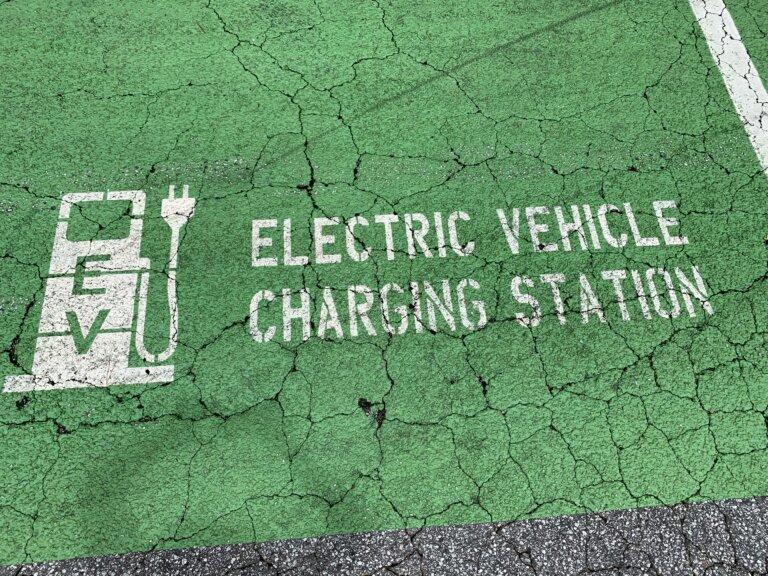
Caption
Once a leading state for newly registered electric vehicles, Georgia now ranks 10th in the country for the number of electric vehicles on the roadway.
Credit: Jill Nolin/Georgia Recorder

Once a leading state for newly registered electric vehicles, Georgia now ranks 10th in the country for the number of electric vehicles on the roadway.
Shelley Francis was trying to get from one meeting to the next in DC when she pulled out her phone to request an Uber driver. A few minutes later, a Nissan LEAF showed up.
She knew the vehicle escorting her to the next stop was electric powered, but wasn’t the car’s range limited?
“I spent that whole ride asking the driver questions like how does this work for Uber? Do you ever run out of charge?” said Francis, who lives in Smyrna. “By the end of that ride, which is probably only like 15-20 minutes, I was looking up the 10 best electric vehicles.”

Shelley Francis is an electric car driver and the co-founder of a group called EVHybridNoire, which has a diverse membership of drivers who own everything from a used 10-year-old LEAF to flashier, sportier models.
Francis came back home and found a used Nissan LEAF for under $10,000 that she charged using the existing 110-volt outlet in her garage.
She was intrigued. As a former medical school professor focused on environmental health, Francis was also keenly aware of the disproportionate impact traffic emissions have on the health of communities of color often found near busy corridors.
Five years later, Francis is focused on convincing more Black and Latino drivers, and other communities overexposed to transportation emissions, to get behind the wheel of a plug-in car. She has co-founded a group called EVHybridNoire, which has a diverse membership of drivers who own everything from a used 10-year-old LEAF to flashier, sportier models like the Ford Mustang Mach-E and the Porsche Taycan.
“People need to see themselves utilizing this technology,” she said. “It’s pretty new and it’s kind of cutting edge, and it may be scary for folks to break that 100 years of habit of driving a gas vehicle. They’re kind of being a trailblazer for their friends and family.”
So far, though, only a sliver of the driving public here has made the switch. Once a leading state for newly registered electric vehicles, Georgia now ranks 10th in the country for the number of electric vehicles on the roadway.
Today, there are about 24,400 electric vehicles in Georgia, with about one-third of them found in Fulton County, according to Cox Automotive’s analysis of IHS Polk data. Other top counties — DeKalb, Cobb, Gwinnett and Forsyth — are also in metro Atlanta.
Overall, the number of electric vehicles in Georgia — a state that is the future home of SK Innovation, a sprawling plant that will make batteries for Ford and Volkswagen electric models — make up only a little more than 1% of all automobiles newly registered in the state. That small percentage has held steady the last three years.
Advocates say there are several factors pumping the brakes on broader adoption of electric vehicles in a state that took the lead in plugging in several years ago. Chief among them is likely the decision to end a generous $5,000 tax break in 2015 while also creating an annual fee for electric vehicles.
They say that fee could be scaring off motorists who might otherwise be ready to trade in their gas-powered car. The fee is set at nearly $214 this year, which they argue is more than many motorists pay in fuel taxes each year.

SK Innovation is building a sprawling plant in Commerce that will make Georgia a hub for electric vehicle battery manufacturing.
The state’s gasoline tax is 28.7 cents a gallon. A compact SUV owner would have to fill up every week to pay about the same in fuel taxes every year.
Lawmakers packed the fee into a 2015 transportation bill designed to pump more funds into repairing the state’s crumbling roads and bridges. Last year, electric vehicle owners chipped in $5 million in revenues, according to the state Department of Revenue.
Georgia is among the more than two dozen states that have a special fee for electric cars, with the fees ranging from $50 to $225. That includes California, the top state for the number of zero-emission cars on the roadway, where it costs $100. Florida, the second leading state for electric vehicles, does not have a fee.
Anne Blair, director of energy efficient transportation for the Southeast Energy Efficiency Alliance, says lawmakers were too quick to stick electric car drivers with a fee.
“When the industry meets 20% or 25% of the market, then it might make sense to add a fee, but when it’s in such an early stage, it is punitive,” Blair said.
“I don’t think that the fee is the main cause of new people (not) getting EVs, but it’s certainly a deterrent,” she added. “And it’s particularly a deterrent for lower income people taking advantage of the lower prices of used EVs. I mean, you can get a Nissan LEAF now for around $8,000, but the $200 annual fee does cut into that, and it is a larger impact for somebody on an annual basis.”
Francis of EVHybridNoire said she believes the fee is a barrier for some people.
“That may be a deterrent for somebody who’s already like, ‘Oh, you want me to get this new technology, and then I got to think about charging, and I have to pay this additional fee? Like this is just too cumbersome for me to make this investment right now,’” she said.
Attempts to resurrect the tax credit or revisit the fee over the years since have gone nowhere.
Lawmakers did lower, however, lower the amount due for low-speed vehicles like golf carts this session at the behest of state Rep. Chuck Martin, an Alpharetta Republican.
Martin, who drives a hybrid car, said in an interview that he agrees the state’s fee for electric vehicles is too high and should correlate more with the tax someone would pay driving a comparable gas-powered model.

State Rep. Chuck Martin, an Alpharetta Republican, is pushing a bill that would allow more electric vehicle manufacturers to sell directly to consumers in Georgia, as Tesla has done for years. Here he is seen during the legislative session in March, when the state’s auto dealers succeeded in stalling his bill.
The north Fulton County lawmaker who once pushed to end the tax credit also said he would support a revamped incentive, if it were smaller and helped people get into a range of models. Some people famously used Georgia’s tax credit to pay virtually nothing to lease a Nissan LEAF.
But that’s not where Martin’s channeling his energy these days.
Martin pushed a proposal this year that would allow more electric vehicle manufacturers to move into Georgia and sell directly to consumers, as Tesla has now done for years.
His goal: Increase competition and choices for consumers.
“I’m just excited about the capital deployed on this technology and the market driving the pickup of the technology rather than paying people to buy it,” said Martin, who chairs the House Higher Education Committee.
“It’s a chicken and egg thing. The more cars there are, the more infrastructure that there will be,” he said, referring to charging stations. “The more infrastructure there is, the more people who will buy cars.”
The bill, which has co-signers from both political parties, received a hearing this session. But it ran into strong opposition from the state’s powerful auto dealers who have traditionally counted on seeing buyers again when they bring their vehicles back in for routine maintenance, like oil changes and the replacement of timing belts and other parts not found in an electric vehicle.
A handful of dealers who appeared before lawmakers this session touted their electric vehicle chops.
“One of the best whoppers that’s being told right now about us is that we’re opposed to this bill because we fear competition,” Ben Jordan, a lobbyist with the Georgia Automobile Dealers Association, told lawmakers earlier this year. “Dealers thrive on competition. Competition is baked into every aspect of the vehicle franchise system.”
The dealers argued the change Martin is proposing would undermine that franchise system, where manufacturers sell their models through dealers, and threaten the jobs of those employed at dealerships across the state.
“One thing you need to protect is the jobs,” said Steve Ewing, president and CEO of Wade Ford in Smyrna. “These people will fill an Apple-type store with a few people in khaki pants and try to compete with dealers that have to do all the things we need to do.”
Martin counters that his bill would only apply to manufacturers of zero emission vehicles, such as Rivian and Lucid, with no existing dealer connection in Georgia. So, it wouldn’t allow Ford, for example, which is coming out with some of its own electric models, to start bypassing dealer lots.
A Lucid representative told lawmakers this session that already more than 83% of electric vehicles bought in Georgia last year were purchased directly from manufacturers.
Electric vehicle makers and supporters say Martin’s proposal would enable consumers to interact with specialists, improving their chances of a positive first-time experience with a new technology. And it would spare Georgians from having to jump through additional hoops – and drive out of state – to buy from these new manufacturers.
The bill remains alive for next year. And this time, Martin says he plans to limit the proposal to what’s known as the “nonattainment” zone in metro Atlanta, which is a seven-county area where air quality does not meet national standards.
“That’s where it’s more populated, that’s where there’s going to be more charging infrastructure, but more critically, that’s where having EVs would be important because of the non-attainment area,” Martin said.
Sen. Elena Parent, an Atlanta Democrat, is among the lawmakers who have tried unsuccessfully to have the state’s fee for electric vehicles nixed and the tax credit brought back.
But even so, she said she thinks people who are interested in making the switch will likely do so despite the fee, partly because they are still going to save money from not fueling up and the lower maintenance costs.
“People who are interested in electric vehicles are interested in the good that they’re doing for the environment and as the Colonial Pipeline brouhaha demonstrated, there are benefits to not being reliant on the gasoline network,” Parent said.

A ransomware attack on Alpharetta-based Colonial Pipeline wrecked the supply chain for the entire Southeast last month, leading to out-of-service signs popping at fuel pumps like this one in Acworth.
A ransomware attack on Alpharetta-based Colonial Pipeline wrecked the supply chain for the entire Southeast last month, triggering people to frantically purchase gas and leading to out-of-service signs popping at fuel pumps across the state.
An electric vehicle’s limits when it comes to hitting the road for long trips may be a bigger deterrent for many people right now, triggering what’s known as “range anxiety.” Newer models, though, are boasting longer ranges, with even the new Ford F150 Lightning — a pickup truck — expected to reach up to 300 miles.
Most day-to-day battery charging, though, is done at home.
“I think until people feel confident that they can go on a long trip, it’s going to be hard to get them to say, ‘I can only have an electric vehicle,’” Parent said. “So, I do think infrastructure is important.”
Notably, the state’s largest electric utility, Georgia Power, included charging stations in its most recent rate case before the elected Public Service Commission, which decides how much cost can be passed along to consumers.
The commission approved $24 million for two programs that help reduce the cost of installing charging stations at businesses and devote funds to fast-charging stations for the public – 50 of which have been installed statewide. A pair of solar-powered charging stations were also installed at Atlanta Technical College and Valdosta State University.
“Georgia is already the sixth largest market in the nation for EV charging and Georgia Power continues working to fill charging gaps and help get more EVs on the road,” Georgia Power spokeswoman Allison Erdman Gregoire said in a statement. “Expanding the use of electricity in transportation saves money, improves the environment and enhances quality of life for our customers and communities.”
President Joe Biden has also pressed to include money for electric vehicle charging infrastructure in his sweeping jobs plan, which has undergone intense behind-the-scenes negotiations for weeks.
Transportation Secretary Pete Buttigieg visited Atlanta last month to champion Biden’s infrastructure plan, saying it would “trigger an electric vehicle revolution and make sure that electric vehicle revolution is made in America.”

Transportation Secretary Pete Buttigieg visited Atlanta last month to champion Biden’s infrastructure plan, saying it would “trigger an electric vehicle revolution.”
“Electric vehicles are coming in force,” U.S. Sen. Jon Ossoff told reporters during Buttigieg’s visit to Atlanta. “And we need to prepare our surface transportation infrastructure for that by beginning to put everything in place necessary to have the density of charging stations to support electric vehicles.”
A recent iteration of an infrastructure deal included about $10 billion for charging stations, with electric vehicle users asked to pay a fee to go toward paying for the package. But some lawmakers have already objected to the fee, and the bipartisan negotiations continue.
Blair with the Southeast Energy Efficiency Alliance said a federal investment could significantly accelerate the pace of the shift to electric vehicles in America, although the bill’s path ahead remains far from certain.
“I think, from a public health, climate and economic opportunity aspect, doing that is what we need — we need to speed those things up,” she said. “We need to slow climate change. We need to protect more people from getting sick. And with federal investment, we can speed that up.”
A poll of voters released this month in the competitive 6th and 7th congressional districts found bipartisan support for the American Jobs Plan, according to a survey sponsored by the advocacy groups Environment Georgia, Earthjustice and Environment America.
About two-thirds of respondents said they supported investment in electric vehicles and charging stations to reduce pollution and help more Americans buy clean cars. But that was a drop-off from the 83% in the 6th and the 82% in the 7th who said they backed federal spending to rebuild roads and bridges and modernize public transportation to ensure it is cleaner and more accessible.
Support for dedicating federal dollars toward measures to speed adoption of electric vehicles was higher among young voters, noted Jennette Gayer, director of Environment Georgia.
“Younger voters are more excited about embracing this new technology. So, I think that like a lot of new technology, there are early embracers and then there’s people who really need to kind of kick the tires,” Gayer said.
This story comes to GPB through a reporting partnership with Georgia Recorder.